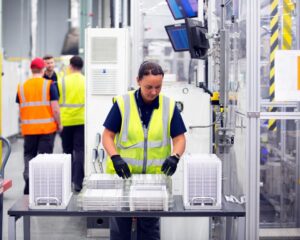Sunderland Gigafactory Expansion: A Major Leap for the UK Car Industry
In a significant boost for the UK automotive sector, the owner of the nation’s only operational gigafactory has secured £1 billion in funding to establish a new electric vehicle (EV) battery plant in Sunderland. This government-backed initiative comes at a crucial time for the struggling British car industry, reaffirming the focus on sustainable technologies and potential job creation.
Strategic Funding Breakdown
The funding, a combination of public and private investment, will empower Japan’s AESC to install state-of-the-art tooling and commence battery production at the new facility. This plant aims to directly support Nissan’s nearby manufacturing operations, with more than 1,000 jobs expected to be created.
Crucially, both the National Wealth Fund and UK Export Finance—a pair of government entities—will provide substantial financial guarantees. This will unlock £680 million in financing specifically for AESC, alongside an additional £320 million drawn from private sources and new equity investments.
Economic Resilience and Job Creation
Chancellor Rachel Reeves, who announced the deal in Sunderland, emphasized its importance for British industries. She stated, “This investment will not only drive innovation and advance sustainable transportation but will also deliver much-needed, well-paying jobs in the North East.” This sentiment reflects a growing movement in the UK to pursue green technologies and create resilient local economies.
AESC’s Ambitious Plans
AESC already operates a gigafactory in Sunderland, yielding a cumulative capacity of 1.8 gigawatt hours (GWh) annually. This facility has currently been serving Nissan’s electric Leaf model and will now support the new iteration of this popular EV. Initially, in 2021, AESC aimed for an ambitious expansion plan to reach up to 38 GWh in two phases, though demand fluctuations in the EV sector have tempered its growth projections. The revamped first phase is now expected to deliver 15.8 GWh per year, enough to power approximately 300,000 electric cars.
Interestingly, the second phase of this ambitious project remains in the feasibility study phase, showcasing the unpredictable nature of the current automotive market, where demand does not always align with production capacity.
Political and Economic Context
Business Secretary Jonathan Reynolds highlighted this funding as an "unequivocal vote of confidence in the North East’s flourishing auto manufacturing hub." This kind of governmental backing has become increasingly crucial, especially in light of recent tariffs affecting British automotive exports.
Just a day before this announcement, UK and US trade representatives reached an agreement to significantly reduce tariffs on British cars—capping the duty at 10% for up to 100,000 vehicles, down from the previously announced 27.5% rate. This development stands to fortify the relationship between the two countries and bolster the UK’s primary car export market, valued at over £9 billion in 2024, presenting ample opportunity for both local industries and investors.
The Bigger Picture: Beyond Sunderland
While the investment in Sunderland marks a pivotal moment for the UK automotive industry, it also serves as a microcosm of broader trends impacting global supply chains and energy policies. As companies across the spectrum pivot toward greener technologies, there lies a significant opportunity for investors and stakeholders to get involved early. The financial mechanisms in place, like the National Wealth Fund, are designed to empower similar advancements throughout the UK’s industrial landscape—beginning with essential projects like this gigafactory.
Conclusion
The funding secured for AESC’s new battery plant in Sunderland is just the beginning of a promising trajectory for the electric vehicle market in the UK. As we continue to strategize and invest in the future of sustainable transportation, the focus will remain on innovation, job creation, and bolstering local economies. As an investor, staying informed and positioning yourself within these emerging sectors could yield fruitful returns, translating technological advancements into financial success.
Stay tuned with Extreme Investor Network for more insights on the evolving landscape of finance and investment in green technology!

